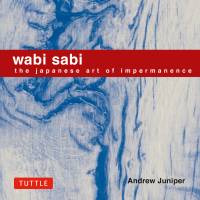Japan's passion for the modern coexists with aesthetic proclivities that favor antiquity and refinement.
Wabi Sabi: The Art of Impermanence, by Andrew Juniper.
176 pages
TUTTLE, Nonfiction.
One expression of the appreciation for age and beauty is the much-cherished effect known as wabi-sabi, the subject of Andrew Juniper's well-considered and surprisingly accessible book. The etymology of the expression is revealing: wabi stems from wabishii (lonely, wretched), while sabi touches both sabiru (to age and mature) and sabishii (lonely, inconsolable). The compound suggests a desolate beauty transformed by weathering, the resulting patina of age creating an object or scene of exquisite maturity and taste.
Japanese aesthetics can seem impossibly complex. Central posits of Zen aesthetics, such as yūgen (unfathomable depth), vital to the principals of Japanese garden design, for example, may baffle the uninitiated. But the aesthetician visiting the garden of Ryoanji Temple will be well equipped to admire its fine rock compositions as well as its often overlooked aburabei walls.
Here, the clay has been infused with oil, which has seeped out over the years, causing pleasing changes in the tonal quality of its surfaces. We know that, unlike the rocks in the garden, the walls will collapse or have to be shored up and rebuilt. Its very impermanence increases its existential value. This is wabi sabi.
The cumulative effect, as Juniper explains in his graceful text, is to suggest both passing time and time transfixed.
Read archived reviews of Japanese classics at jtimes.jp/essential.

















With your current subscription plan you can comment on stories. However, before writing your first comment, please create a display name in the Profile section of your subscriber account page.